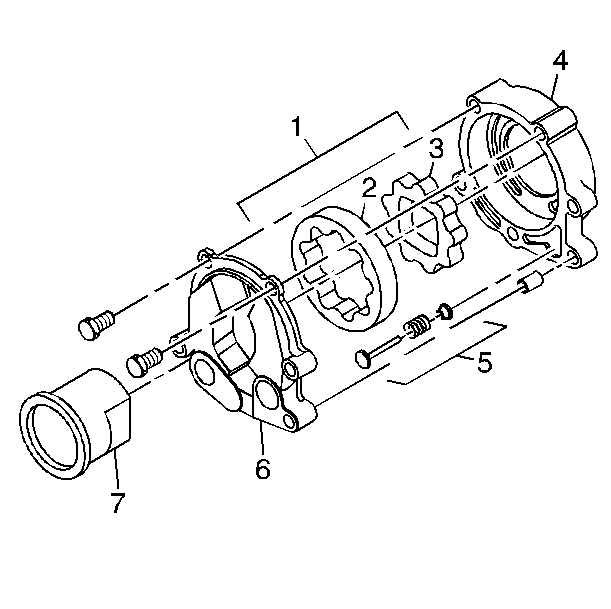
- Disassemble the oil pump using the following procedure:
| 1.1. | Remove the drive spacer from the oil pump housing. |
| 1.2. | Remove the two screws holding the pump housing halves together. |
| 1.3. | Remove the inner (drive) and the outer (driven) rotors from the
housing. Mark the mating surfaces. The inner rotor will have a dimple while
the outer rotor has a chamfered edge. |
| 1.4. | Remove the oil pressure relief valve and the spring. |
| 1.5. | Clean the oil pump components in solvent. |
- Inspect the oil pump components for the following conditions:
Important: The internal parts of the oil pump are not serviced separately. If wear
or damage is noted, replace the entire pump assembly.
| • | The housing and the cover for cracks, scoring, casting imperfections,
and damaged threads |
| • | The rotor gears for chipping, galling or wear |
| • | Pressure relief valve for embedded particles and/or damage |
- Assemble the oil pump using the following procedure:
| 3.1. | Install the inner and the outer rotors in the pump cover in the
same orientation as removed. |
| 3.2. | Install the pressure relief valve seat, spring and pilot in the
pump housing. |
| 3.3. | Pack the pump housing with white petroleum jelly to ensure pump
priming. |
| 3.4. | Assemble the housing and cover over the locating dowel. |
| 3.5. | Insert a 3/8 in. (9.5 mm) drill in the pump mounting
hole on the opposite side in order to aid in the alignment of the housing
and cover. |
| 3.6. | Install the two retaining screws. |
Tighten
Tighten the screws to 10 N·m + 35 degrees (89 lb in
+ 35 degrees).
Notice: Use the correct fastener in the correct location. Replacement fasteners
must be the correct part number for that application. Fasteners requiring
replacement or fasteners requiring the use of thread locking compound or sealant
are identified in the service procedure. Do not use paints, lubricants, or
corrosion inhibitors on fasteners or fastener joint surfaces unless specified.
These coatings affect fastener torque and joint clamping force and may damage
the fastener. Use the correct tightening sequence and specifications when
installing fasteners in order to avoid damage to parts and systems.

